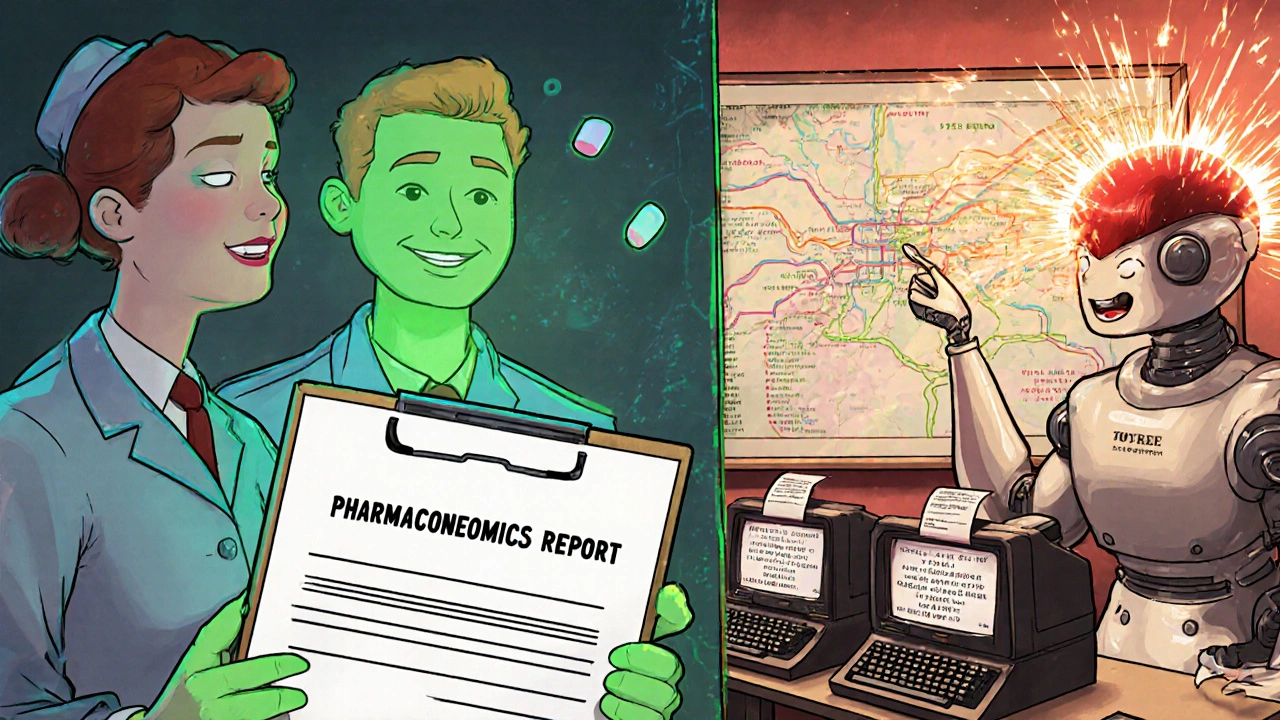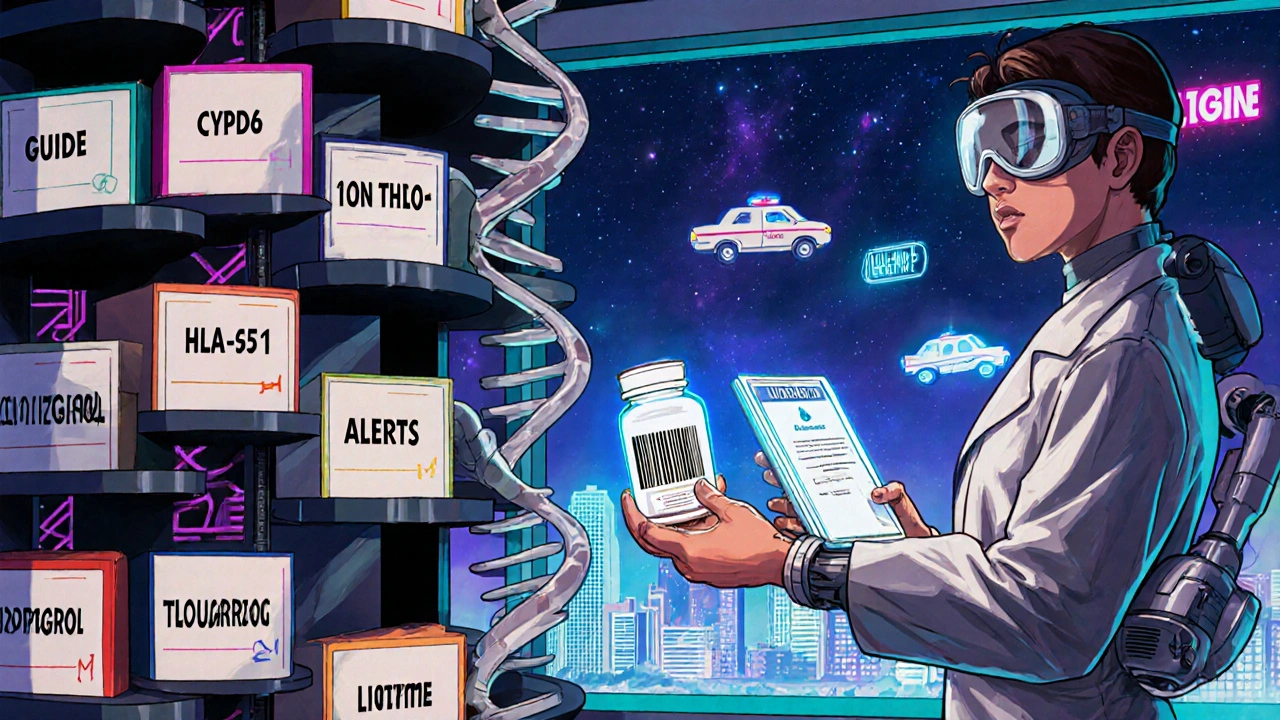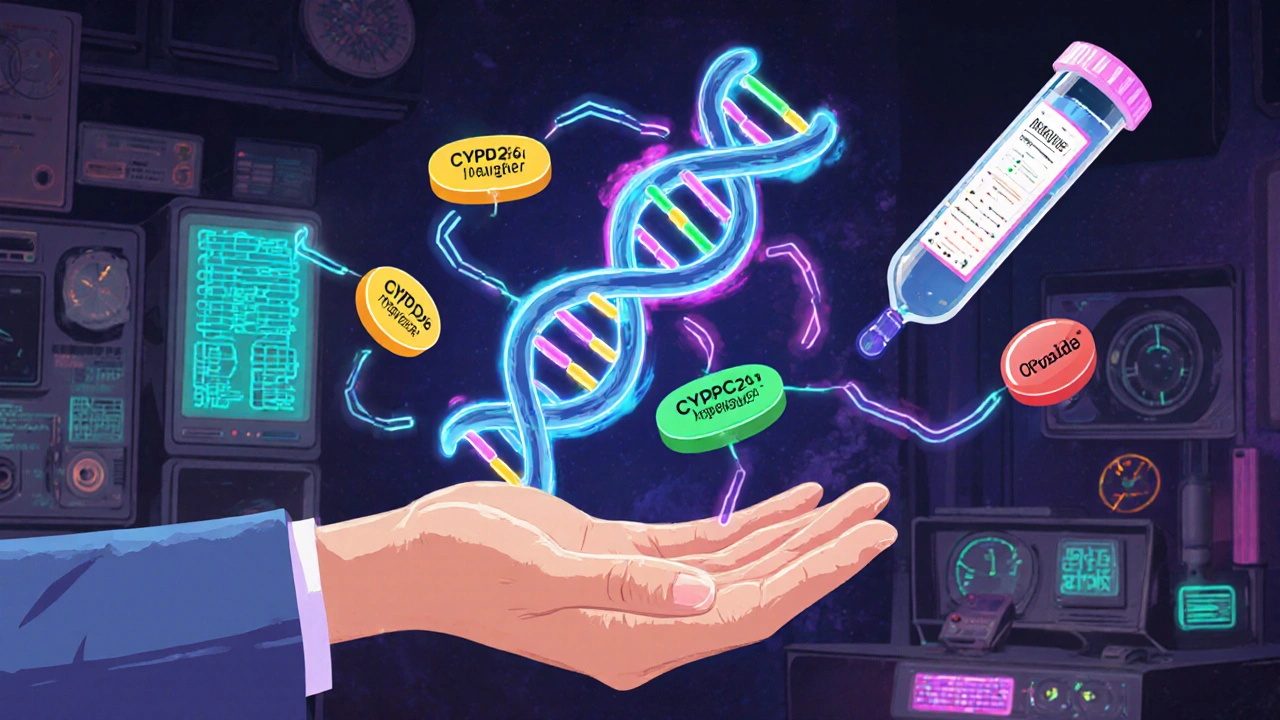Pharmacogenomics Medication Compatibility Checker
Enter medications you're taking or might take. Our tool checks for known genetic interactions based on key genes like CYP2D6, CYP2C19, and CYP2C9.
Every year, over 100,000 Americans die from reactions to medications that were supposed to help them. Not because the drugs are dangerous - but because they weren’t right for the person taking them. This isn’t bad luck. It’s biology. Your genes play a bigger role in how your body handles medicine than most doctors or patients realize. That’s where pharmacogenomics testing comes in.
What Pharmacogenomics Testing Actually Does
Pharmacogenomics testing looks at your DNA to predict how you’ll respond to certain drugs. It’s not about diagnosing disease. It’s about matching you to the right pill at the right dose - before you even take it. Think of it like this: two people take the same antidepressant. One feels better in weeks. The other feels worse, with nausea and dizziness. Same drug. Same dose. Different outcomes. Why? Their genes are different. Specifically, genes like CYP2D6, CYP2C19, and CYP2C9 control how quickly your liver breaks down medications. If you’re a slow metabolizer, a standard dose can build up to toxic levels. If you’re a fast metabolizer, the drug gets cleared before it can work. The FDA already lists 178 drugs with pharmacogenomic guidance in their labels. For example, before prescribing abacavir (an HIV drug), doctors must test for the HLA-B*57:01 gene variant. People with this variant have a 50-60% chance of a life-threatening allergic reaction. Testing prevents that. It’s not optional anymore - it’s standard care.Where It Makes the Biggest Difference
Pharmacogenomics isn’t useful for every drug. It shines where small differences in metabolism lead to big consequences.- Depression and anxiety: A 2022 study found patients who got gene-guided antidepressants were 30.5% more likely to go into remission than those on standard treatment. One patient on Reddit tried five SSRIs with no luck. After a GeneSight test showed she was a CYP2D6 poor metabolizer, her doctor switched her to bupropion - and within days, her panic attacks stopped.
- Heart disease: Clopidogrel (Plavix) is meant to prevent blood clots. But 30% of people have a CYP2C19 variant that makes the drug useless. These patients are at high risk for heart attacks. Testing identifies them so doctors can switch to ticagrelor or prasugrel - drugs that work regardless of genetics.
- Pain management: Opioids like codeine and tramadol rely on CYP2D6 to become active. Poor metabolizers get no pain relief. Ultra-rapid metabolizers turn the drug into morphine too fast, risking overdose. Genetic testing helps avoid both.
- Cancer treatment: Tamoxifen, used for breast cancer, only works if the body converts it using CYP2D6. Patients with certain variants get little benefit. Testing lets oncologists choose letrozole or anastrozole instead.
How the Test Works - And What It Costs
Getting tested is simple. You spit into a tube or give a blood sample. The lab looks at 10-50 key genes linked to drug metabolism. Results come back in 3-14 days. There are three main types of tests:- Targeted panels ($250-$500): Test only the most important genes like CYP2D6 and CYP2C19. Best for most people.
- Whole exome sequencing ($500-$1,000): Looks at all protein-coding genes. More data, but often unnecessary.
- Whole genome sequencing ($1,000-$2,000): Maps your entire DNA. Overkill for medication guidance right now.

Why It’s Not Everywhere Yet
You’d think this would be standard by now. But it’s not. Doctors aren’t trained in genetics. A 2022 survey found only 15% of physicians feel confident interpreting pharmacogenomic reports. Pharmacists are better equipped - 72% of academic hospitals now have pharmacogenomics specialists. But most primary care clinics don’t. Electronic health records rarely flag gene-drug conflicts automatically. Epic and Cerner have started adding CPIC guidelines, but many systems still don’t. A patient might get tested, but the doctor never sees the report. There’s also a misconception that genetics explains everything. It doesn’t. For most drugs, genes only account for 10-15% of why someone responds a certain way. Age, diet, other meds, liver health, and even gut bacteria matter too. Pharmacogenomics narrows the guesswork - it doesn’t eliminate it.How It Compares to Other Methods
Some doctors still use therapeutic drug monitoring (TDM) - drawing blood to measure drug levels. It’s useful for drugs like warfarin or lithium. But it’s reactive. You have to give the drug first, wait for side effects, then test. Pharmacogenomics is proactive. You test before prescribing. One test can guide treatment for years. TDM costs $150-$300 per draw. A one-time pharmacogenomic test costs $250-$500 - and can inform dozens of future prescriptions. For patients on multiple meds - like someone with depression, high blood pressure, and diabetes - pharmacogenomics is far more efficient than repeated blood tests.
Real Results - And Real Limitations
Patient reviews on Healthgrades average 4.1 out of 5 stars. 68% say their meds finally worked after testing. But 42% say their doctors didn’t act on the results. One patient described it this way: “I expected the test to fix all my problems. It only helped with three of my ten medications. But those three? They changed my life.” The science is solid for about 30 gene-drug pairs, according to the American College of Medical Genetics. But there are over 1,000 known gene-drug interactions. Most are still being studied. And the data is heavily skewed toward people of European descent. For African, Asian, or Indigenous populations, the evidence is weaker - or missing entirely.What’s Next for Pharmacogenomics
The field is moving fast. In 2023, the FDA approved the first next-generation sequencing test for 24 genes and 350+ medications. The NIH’s All of Us program has collected genetic data from over 620,000 Americans - including diverse populations - and is now returning pharmacogenomic results to participants. EHR systems are getting smarter. Epic now auto-alerts doctors when a patient’s gene profile conflicts with a prescribed drug. Point-of-care tests - think a handheld device that gives results in 10 minutes - are in clinical trials. By 2027, experts predict 30% of prescriptions will use pharmacogenomic data. Right now, it’s under 5%. By 2030, half of all U.S. adults may have their pharmacogenomic profile stored in their medical record.Should You Get Tested?
If you’ve tried multiple medications without success - especially for depression, anxiety, pain, or heart conditions - testing could save you months of trial and error. If you’re on five or more prescriptions, the chance of a harmful gene-drug interaction rises sharply. A single test could prevent a hospital stay. If you’re healthy and just curious? It’s not urgent. But if you ever need medication, you’ll already have the data. Talk to your doctor or pharmacist. Ask if they’ve used pharmacogenomics before. If they haven’t, ask for a referral to a clinical pharmacist who specializes in genetics. Don’t order a test online without medical guidance - interpreting results without context can lead to dangerous decisions. This isn’t science fiction. It’s medicine catching up to biology. Your genes have been talking to your body all along. Pharmacogenomics is just helping us listen.Is pharmacogenomics testing covered by insurance?
Medicare covers testing for specific cases, like treatment-resistant depression or before starting clopidogrel. Private insurance coverage is spotty - only about 35% of plans pay for it. Some labs offer self-pay pricing between $250 and $500. Always check with your provider before testing.
How long do pharmacogenomics test results last?
Your genes don’t change. Once you’re tested, the results are valid for life. You only need to do it once. The report can guide future prescriptions for decades - even if you switch doctors or health plans.
Can pharmacogenomics tell me if I’ll get addicted to opioids?
No. Pharmacogenomics can tell you how your body metabolizes opioids like codeine or tramadol - whether you’ll get strong pain relief or risk overdose. But it doesn’t predict addiction risk, which involves brain chemistry, mental health, and environment - not just genes.
Do I need to fast or prepare before the test?
No. Unlike blood tests for cholesterol or glucose, pharmacogenomics only looks at your DNA. You can eat, drink, or take your meds normally. A saliva swab or blood draw is all it takes.
What if my doctor doesn’t believe in genetic testing?
Ask for a referral to a clinical pharmacist or genetics specialist. Many hospitals now have pharmacogenomics programs. You can also bring printed guidelines from CPIC or PharmGKB - these are peer-reviewed, evidence-based resources doctors trust. Sometimes, showing them the data makes the difference.


robert cardy solano
November 20, 2025 AT 01:15Been on 7 different antidepressants over 8 years. Got tested last year after my third hospitalization. Turns out I’m a CYP2D6 ultra-rapid metabolizer. My doctor switched me to bupropion and I haven’t cried in public since. This isn’t magic - it’s biology finally catching up.
Cinkoon Marketing
November 21, 2025 AT 01:12Interesting post but honestly? I’ve seen this hype before. Remember when personalized nutrition was going to save us? Turns out your genes don’t care if you eat kale or donuts. Pharmacogenomics is useful for a handful of drugs, not a silver bullet. Don’t let the labs sell you snake oil.
Pawan Jamwal
November 22, 2025 AT 13:34USA always thinks they’re ahead 😂 In India, we just take what the doctor gives and pray. But seriously - this is amazing! My uncle got tested after 3 heart attacks on Plavix. Switched to ticagrelor and now he hikes in the Himalayas. 🇮🇳❤️
Bill Camp
November 23, 2025 AT 01:06THIS IS THE FUTURE. WE’RE NOT JUST TREATING DISEASES - WE’RE HACKING HUMAN BIOLOGY. THE GOVERNMENT SHOULD BE MANDATING THIS FOR EVERYONE. WHY ARE WE STILL GUESSING WHEN WE CAN KNOW? THIS ISN’T SCIENCE - IT’S JUST COMMON SENSE. WHY ISN’T THIS ON EVERY PRESCRIPTION?!
Lemmy Coco
November 23, 2025 AT 17:27got tested last year after my doc kept prescribing me codeine and i’d just feel weird and tired. turns out i’m a slow metabolizer. switched to tramadol and boom - pain gone without the zombie vibes. only issue? my chart still says ‘codeine OK’ even though the report’s been uploaded for 14 months. ehrs are a mess.
rob lafata
November 24, 2025 AT 14:36Let me guess - you’re one of those people who thinks DNA is a magic wand? Wake up. You’re not special. Your genes don’t make you immune to dumb decisions. You still need to stop drinking grapefruit juice with statins. You still need to tell your doctor you’re taking St. John’s Wort. This test doesn’t replace basic medical literacy - it just gives you a head start. And yes, your insurance probably won’t cover it because they’re still stuck in the 1990s.
Matthew McCraney
November 26, 2025 AT 13:53They’re hiding the truth. This tech has been around since 2005. Why is it only available to rich folks? Big Pharma doesn’t want you to know your body can bypass their drugs. They profit from trial-and-error. They profit from ER visits. They profit from you being confused and scared. This isn’t medicine - it’s a corporate cover-up. And don’t even get me started on how they’re using your DNA data to sell ads.
serge jane
November 26, 2025 AT 14:31It’s fascinating how we’ve spent centuries treating symptoms while ignoring the blueprint. Your genes are the operating system - drugs are just apps. Some apps crash on your device. Some run slow. Some don’t install at all. We’ve been treating people like they’re all running Windows 95 while some are on iOS 17. This isn’t just precision medicine - it’s justice. It’s dignity. It’s finally treating humans as individuals instead of statistical averages. And yet we still treat genetic data like a luxury. That’s the real tragedy.
Nick Naylor
November 27, 2025 AT 19:57According to the CPIC guidelines (2023 update), CYP2D6, CYP2C19, and CYP3A4 variants account for 72% of clinically actionable pharmacogenomic interactions. The FDA’s Table of Pharmacogenomic Biomarkers in Drug Labeling (Version 5.1) includes 178 drugs - but only 32% of U.S. primary care providers have received formal training in pharmacogenomics interpretation. Furthermore, EHR integration remains inconsistent across Epic, Cerner, and Allscripts platforms - resulting in a 41% failure rate in report delivery to clinicians. This is not a technological gap - it is a systemic failure of medical infrastructure.
Brianna Groleau
November 28, 2025 AT 05:37I’m a nurse in rural Ohio. Last month, a 68-year-old woman came in with chronic pain and depression. She’d tried 11 meds. Her daughter brought her GeneSight report from a private lab. We showed it to the local pharmacist - she cried. Said she’d been waiting 12 years for someone to listen. We switched her to a low-dose nortriptyline and added gabapentin. Two weeks later, she brought us cookies. Said she slept through the night for the first time since 2011. I didn’t need a PhD to know this mattered. Just a heart.
Rusty Thomas
November 28, 2025 AT 05:43OMG I JUST GOT TESTED AND MY DOCTOR SAID ‘I’VE NEVER SEEN THIS BEFORE’ 😭 I’M A CYP2C19 EXTREMELY SLOW METABOLIZER AND I WAS ON CLOPIDOGREL FOR 3 YEARS AND I THOUGHT I WAS JUST ‘SICKLY’ 😭 NOW I’M ON TICAGRELOL AND I FEEL LIKE A NEW PERSON. MY KNEES DON’T HURT. I CAN WALK TO THE STORE. I’M CRYING RIGHT NOW. THIS IS A MIRACLE. I’M TELLING EVERYONE. #PHARMACOGENOMICSISREAL
Sarah Swiatek
November 29, 2025 AT 14:34Let’s be real - this isn’t about whether the science works. It’s about whether the system is willing to change. I’ve seen too many patients with perfect reports sitting in their charts, ignored because the doctor’s too busy, too skeptical, or too lazy to read them. The test is the easy part. The hard part is convincing a 60-year-old GP who learned pharmacology in 1987 that genetics matters. That’s why we need clinical pharmacists embedded in every clinic. Not as consultants. As standard staff. Because no one should have to beg for their own biology to be taken seriously.